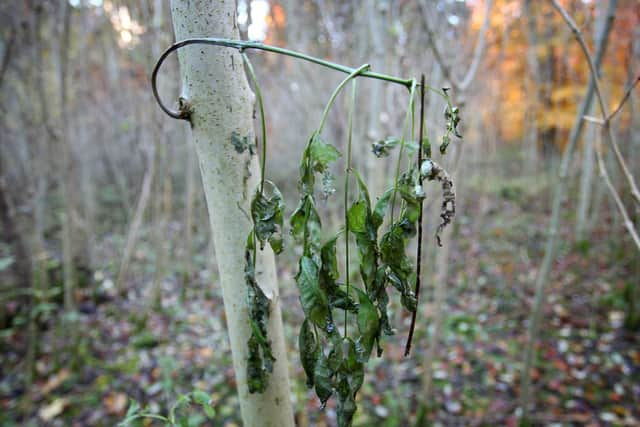Sheffield council will have to remove more trees to tackle Ash Dieback threat
and live on Freeview channel 276
Sheffield City Council says it could lose up to 215,000 ash trees in the city to Ash Dieback, which has already had a major impact across other parts of Yorkshire and the Peak District.
The Labour-run authority, which had a eight-year legal battle with a campaign group over its policy of felling street trees, says infected trees need to be taken down before they become a public danger.
Advertisement
Hide AdAdvertisement
Hide AdMary Lea, the council's Cabinet Member for Culture, Parks and Leisure, said: “I understand that there may naturally be some concerns about the removal of trees and I want to reassure people that it’s the last thing we want to do.
"However, we have to prioritise the safety of people and so we are closely following national guidance from The Tree Council to manage this situation as best we can, and make sure we retain as many Ash trees as possible.
“A small number of Ash trees will be resistant, which is why we will only take trees down at absolutely the right time."
Around 90 per cent of England’s Ash trees will die from the highly infectious, incurable disease which is spreading rapidly across Europe.


Advertisement
Hide AdAdvertisement
Hide AdAffected trees become unpredictably brittle and dangerous as the disease takes hold and can drop limbs or fall entirely in the later stages of the disease.
The city council says Sheffield is home to around 253,000 Ash trees and could lose between 127,000 and 215,000, meaning "preventative action now is essential to restore and protect the city’s existing and future Ash population".
Around 153,000 of Sheffield’s Ash trees grow on public land and the remaining 100,000 are on private land.
The council says its parks and countryside service and its Streets Ahead contractor Amey - which was at the centre of its long-running dispute with campaigners - are monitoring all Ash trees for signs of infection.
Advertisement
Hide AdAdvertisement
Hide AdAnd while infected trees need to be taken down before they become a public danger, those that may be resistant to the disease must be retained so that a new generation of more resilient Ash can establish.
Coun Lea said: “In most cases this disease is fatal for Ash trees and we have been monitoring the situation across England closely, in preparation for it taking hold here in Sheffield.
“It is airborne and incurable, and we know from countries overseas and what has happened in the south of England that sadly we stand to lose a huge percentage of our Ash trees.
“Infected trees become very dangerous. To manage the risks we must remove them at the right time, before it becomes unsafe for an arborist to carry out the work.
Advertisement
Hide AdAdvertisement
Hide AdLast week, a ‘peace deal’ was drawn up between Sheffield Tree Action Groups (STAG) and Sheffield City Council, potentially bringing the city’s eight year tree-felling war to an end.
Both sides have agreed to work together on a new ‘shared vision’ for the city’s trees after a long-running saga which saw dozens of arrests, thousands of trees chopped down and a war of words in the courts.
The row - which prompted an intervention by then-Environment Secretary Michael Gove - was centred on tree-felling carried out by contractor Amey under a PFI contract called Streets Ahead.
Christine King, Co-chair of the STAG Steering Group, said it was "deeply saddening" that Sheffield will lose so many native large canopy Ash trees in the coming years as a result of Ash Dieback.
Advertisement
Hide AdAdvertisement
Hide AdShe said: “We recognise the need to ensure the safety of both the public and those who work on trees as these trees decline.
"We will therefore continue to work collaboratively with Streets Ahead, as we have done this last two years, to ensure that felling is only done when individual street trees have declined sufficiently to justify it.
“Through the new Street Tree Partnership, we are working with Streets Ahead, Sheffield City Council and other stakeholders, to ensure we learn the lessons of Ash Dieback and Dutch Elm Disease.
"This means increasing the overall diversity of Sheffield's street trees, maximising their future resilience to the continually emerging new pest and disease threats all UK trees sadly face."